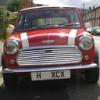
Spark Plugs
#1

Posted 23 February 2010 - 10:08 AM
1990:
What are the plugs to go for? Resisted or not?
#2

Posted 23 February 2010 - 10:10 AM
#3

Posted 23 February 2010 - 10:43 AM
#4

Posted 23 February 2010 - 11:13 AM
#5

Posted 23 February 2010 - 11:29 AM
#6

Posted 23 February 2010 - 11:50 AM
#7

Posted 23 February 2010 - 11:56 AM
#8

Posted 23 February 2010 - 12:11 PM
Roll on the full service this weekend!
#9

Posted 23 February 2010 - 01:22 PM
Along with the information above keep in mind the following basic rule:
If you have resistor spark plug wires, use "regular" plugs. If you have solid core (non-resistive) spark plug wires, use resistor plugs.
Do not use resistor plugs with resistor wires as this may reduce the spark energy. Do not use regular plugs with solid core wires if you like listening to the radio and respect your neighbors.
#10

Posted 23 February 2010 - 04:25 PM
If you have resistor spark plug wires, use "regular" plugs. If you have solid core (non-resistive) spark plug wires, use resistor plugs.
How do you know what HT leads you have? All look the same to me!
Edited by Hughes, 23 February 2010 - 04:26 PM.
#11

Posted 23 February 2010 - 04:50 PM
You can measure the resistance with an ohm meter.. you want the lowest resistance...
#12

Posted 23 February 2010 - 05:35 PM
A resistive wire can have an end to end resistance anywhere from 5k Ohm to 12k Ohm depending on the material and the length of the wire (longer wires having more resistance). If you have a multimeter this is easy enough to measure. The conductive element of some resistive wires is made from carbon fiber. This can be seen on some wires if you peel back the boots that attach to the distributor cap.
A relatively recent development that I'm seeing more of are noise suppression cables based on inductance rather than resistance. Those cables may have silver colored/plated wire wound into a tight spiral instead of straight, fine stranded wire (of a "solid core wire"). Supposedly they work well enough at suppressing the spark noise without dissipating as much energy.
#13

Posted 23 February 2010 - 07:26 PM
I've used NGK BPR6ES spark plugs for years and I tend to change them every 12,000 miles and I've not had a moments trouble with them.
I'm also using these fantastic Luminition HT Leads which I bought from Mini Spares (part no. HV22): -
Click Me...
Their red just like the original HT Leads our Mini Coopers came with.
And my Mini runs like a dream, starts without any drama and came up trumps on the rolling road shoot-out day I took part in with my local Mini Club last year. Oh and it'll be going around the clock very soon too, because it's had a fair bit of use in the 16 years I've owned it.
Edited by taffy1967, 23 February 2010 - 07:28 PM.
#14

Posted 23 February 2010 - 07:55 PM
Nice response dklawson.
1 user(s) are reading this topic
0 members, 1 guests, 0 anonymous users

















